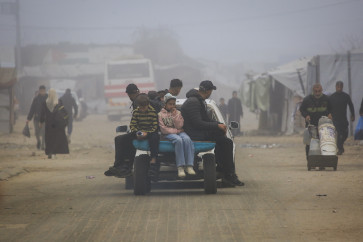Popular Reads
Top Results
Can't find what you're looking for?
View all search resultsPopular Reads
Top Results
Can't find what you're looking for?
View all search resultsLong wet season spawns rising dengue cases
The Health Ministry expects an increase in the number of dengue fever cases this year, the first time in three years, due to the prolonged wet season
Change text size
Gift Premium Articles
to Anyone
T
he Health Ministry expects an increase in the number of dengue fever cases this year, the first time in three years, due to the prolonged wet season.
'As of May 2013, Jakarta had already seen 3,119 cases of dengue fever, almost half of last year's. The trend has repeated in other provinces,' Tjandra Yoga Aditama, the ministry's director general of disease control and environmental health, said recently.
Data from the Health Ministry shows that the reported number of dengue outbreaks was almost 160,000 in 2010, which dropped to just over 90,000 in 2012.
The success in curbing dengue is attributed to a government control program by voluntary larvae controllers, popularly known as jumantik. The fogging takes place each Friday morning in every neighborhood in the country.
'Eliminating mosquito breeding sites is still our main weapon to decrease the incidence of dengue,' Tjandra said. 'We also research the relation between climate change and the number of cases,' he said.
University of Indonesia community health expert Budi Haryanto recently said that the number of cases was likely to increase this year as Aedes aegypti mosquitoes had adapted to the longer rainy season.
Aedes larvae now take less than one week to become adult mosquitoes. The latest generation of Aedes mosquitoes hatch eggs more frequently and mature faster.
'It takes less time for them to grow. They are born 'premature' and have smaller bodies. With smaller bodies, they tend to bite more frequent, so they transmit the virus to more people,' Budi said.
Tjandra said that Indonesia ranked first in the number of dengue fever case across all ASEAN countries last year.
Vietnam and Cambodia in the second and third place saw only 86,000 and 42,000 cases, respectively.
Based on the WHO study, Indonesia is ranked number two, after Brazil, in the period of 2004 and 2010.
'The ideal way to combat dengue is, of course, via vaccine. However, such vaccines don't exist yet,' Tjandra said.
Separately, Husein Habsyi, the deputy chairman of the Public Health Scholars Association (IAKMI), said that despite climate change, the population density played a key role in the increasing number of cases.
'The government is likely focus more on curative measures, as it knows that prevention is the most effective strategy. We have to provide the public more with information and prevent them from catching the virus,' Husein said recently.
Most people with dengue fever recover completely within two weeks. The more clinically severe dengue hemorrhagic fever and dengue shock syndromes can result in vascular damage to blood vessels and the liver. It can be life-threatening, especially to children.
Husein sees the way forward as encouraging provinces to pay larvae controllers with attractive incentives, and to involve the public in the fight against dengue.
'Provincial administration spend a lot of money on treatment, but, for instance, the Jakarta health card that can only be used when a person is already sick,' Husein said.










